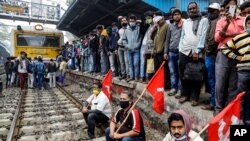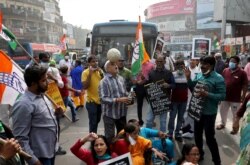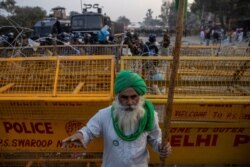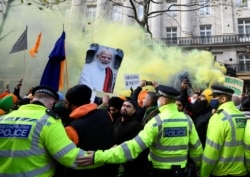A strike called by tens of thousands of farmers in India disrupted rail and road traffic and shut down some of the country’s biggest agricultural markets on Tuesday, as protesters demanded the government scrap new laws that will liberalize the farm sector.
The strike, backed by at least 15 opposition parties, was a show of strength ahead of a fresh round of talks due to be held between the government and the farmers on Wednesday.
The epicenter of the strike is the Indian capital, New Delhi, where tens of thousands of angry farmers from the northern states of Punjab and Haryana have been squatting on five highways leading into the city for nearly two weeks and vowing to remain there until their demands are met.
They have rejected the government’s offer to amend some contentious provisions of the law at two rounds of talks held so far and raised questions over why they were not consulted before the laws were hurriedly passed during a short session of parliament in September.
“If the government was so convinced that the reforms were needed, it needed to engage the farming community before they were enacted,” says political analyst Neerja Chowdhury. “Can you imagine 100,000 farmers sitting in Delhi in the midst of cold, in the midst of Covid? Something is deeply agitating them for them to be coming, some with their families and sitting here.”
During two rounds of talks held so far, the government has tried to persuade the farmers that the reforms will open new opportunities and raise rural incomes by allowing big corporations to buy their produce.
But farmers, who fear that private trade will pave the way for the government to stop its decades-old program of buying rice and wheat in wholesale markets at guaranteed prices, have remained adamant that the laws must be repealed.
Many of the protesting farmers point out that the crops that they currently sell in the open market fetch low prices and fear that the entry of large corporations in farm trade will depress prices even more.
“I sell my potatoes for less than 8 cents a kilo and they are sold for seventy cents to consumers. The situation will worsen with the new laws,” says Binod Kumar, a farmer from Uttar Pradesh state who has joined the demonstrations. “At least future generations will remember us for the revolution we are leading.”
While the government has assured farm leaders that state-run markets will continue, the farmers want legal safeguards that the current system will not be scrapped.
Finding a way out of the impasse will not be easy as the giant protest in New Delhi becomes a flashpoint for the resentment that has been building among farmers in India for years. Most own small plots of land, earn tiny incomes and have long demanded more government support.
“They fear that the big business will come, adequate price will not be paid, and ultimately it will lead to their pauperization and they will be left without their land and they may have to leave their villages,” says Chowdhury. “Bridging the huge trust deficit will not be easy now. This is certainly the biggest challenge Prime Minister Narendra Modi has faced in the last six years.”
The striking farmers have even won support in cities like London, home to an influential Sikh community, where thousands protested outside the Indian embassy on Sunday waving placards such as “Justice for Sikhs.”











